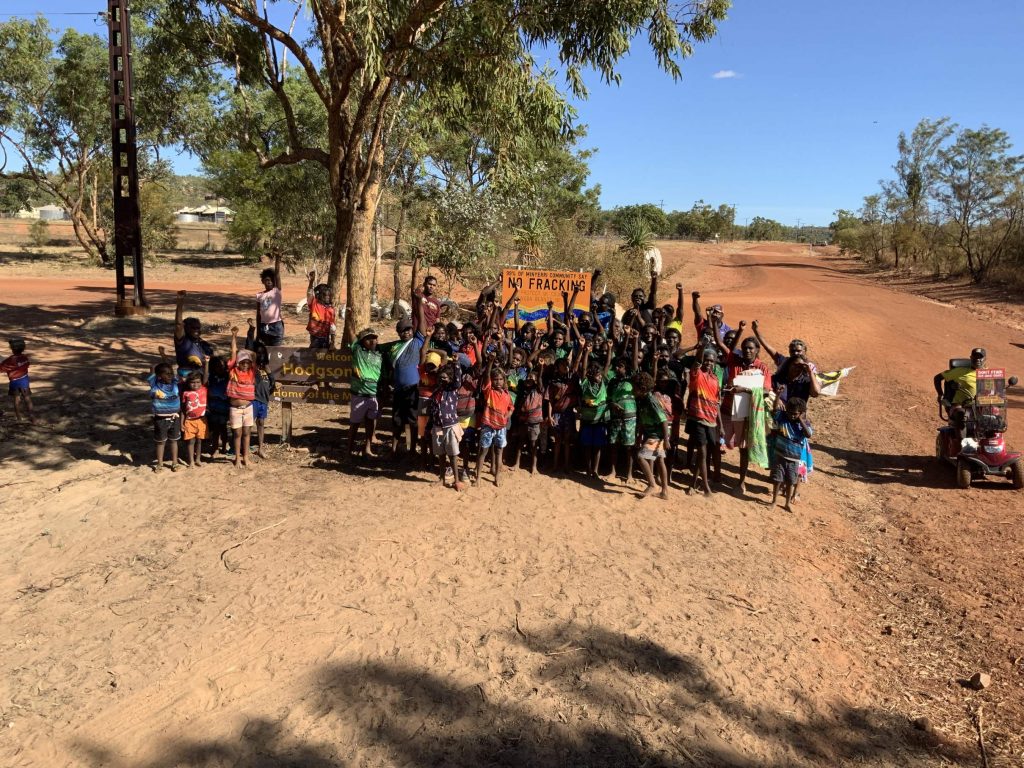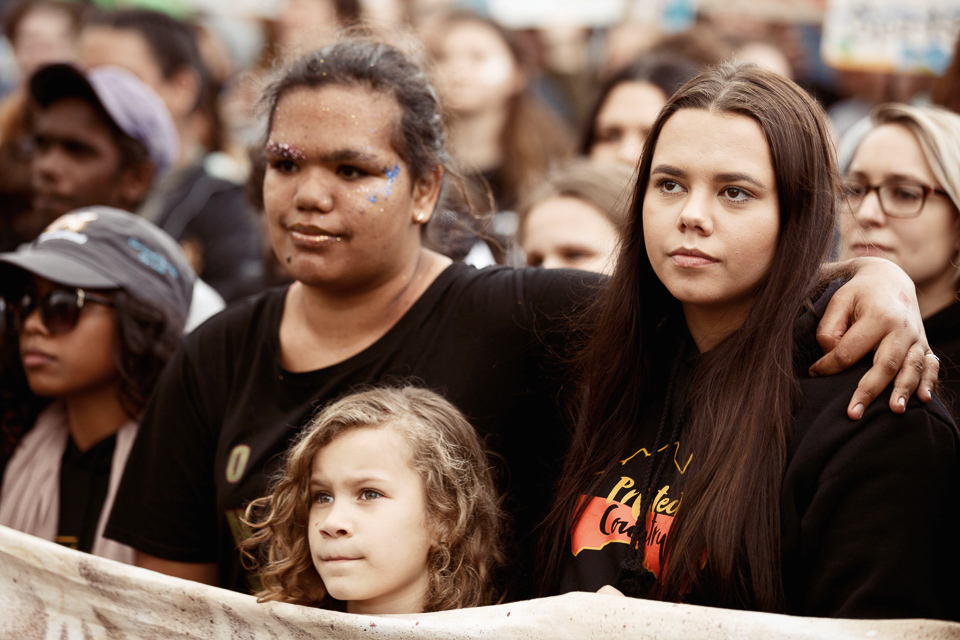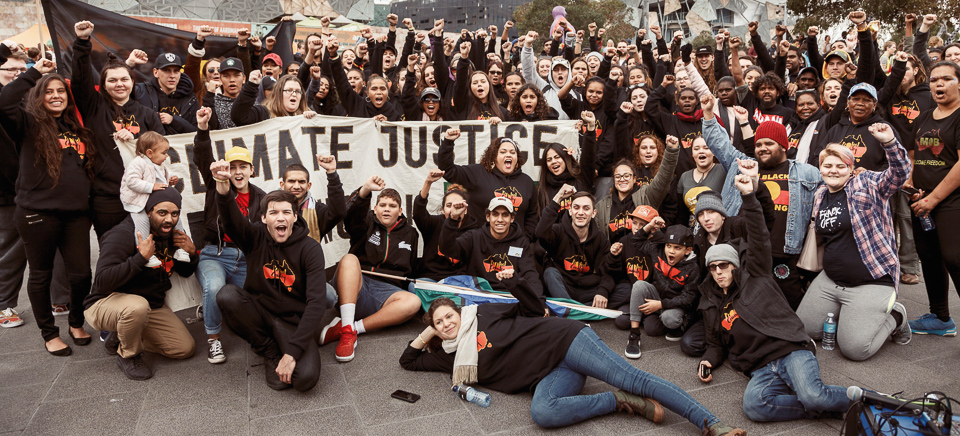Meet Seed Mob, Australia’s First Indigenous Youth-Led Environmental Organisation
"Did you know the Torres Strait islands do not contribute to Australia's emissions? Yet they're the ones that are most greatly affected."

Tish King had just returned from a trip to the Torres Strait when we spoke. She was there visiting her family and re-engaging with the community on behalf of Seed Mob. But while she was there, she had to do something else too — apologise to her ancestors’ bones which have now been uncovered due to erosion.
“I had apologise on behalf of the Australian people because humans are causing this, and the Australian government which is showing no action in helping and supporting our people against climate change. Imagine if someone just desecrated your your grandmother’s burial ground! For people so connected to their culture, it’s the most disrespectful thing that you could ever do.”
Tish, a proud Torres Strait woman from the Kulkalgal nation, started off with Seed as a volunteer and is now a community organiser. Back when she started, Seed was still a program under the Australian Youth Climate Coalition, which it had been since 2014.
But now, with its 35,000 supporters and 250 volunteers across Australia, it has gone independent and become the first and only environmental organisation in the country led by Indigenous young people.
Indigenous people are disproportionately affected by the effects of the ongoing climate crisis, but so far, their voices in the climate justice movement have largely been forgotten or excluded. Still, young activists are rising up everywhere from Uganda, to the Phillipines, to our own backyard where young Indigenous people are fighting to stop fracking in the Northern Territory.
They argue that while their communities contribute almost nothing to global emissions, they bear the brunt of the negative effects of climate change.
“Did you know the Torres Strait islands do not contribute to Australia’s emissions?” Tish asked.
“Yet they’re the ones that are most greatly affected. We have king tides, cyclones, overfishing and coral bleaching threatening the homes and cultures of Torres Strait Islanders while the Australian government refuses to address the climate crisis. Advancing seas are already threatening our homes, damaging burial grounds and our sacred cultural sites. Many of our people are worried that our islands could quite literally disappear in their lifetime if there is no urgent action.”

Photo courtesy of Seed.
Tish started volunteering with Seed because of her connection to her culture, her island, and country.
“People around me, in colonised spaces, were saying that ‘oh, climate change really isn’t real’ or ‘it doesn’t really affect anyone’ but I saw first-hand the changes to my island and to my people. And so joined this group, not really knowing much about it but realised once I became a part of it, how incredible the movement is. It’s a movement of young Aboriginal and Torres Strait Islander people fighting to protect their lands and oceans from the causes and impacts of climate change. And it was the first time I was in a room full of other brothers and sisters that were standing up to fight that fight.”
“And that’s why it’s so important that Seed exists. We’re really elevating the voices of traditional owners and their communities to stand up and fight against corporations and their shareholders.”
When asked about her trip back to the Torres Strait, Tish spoke of the tough year it’s been for everyone, but especially Indigenous populations who often live in remote communities because they “have been so disconnected. They had to shut off their own community and not let anyone in for their own safety. And the hardest thing is they don’t have the resources like urban populations have.”
In the Torres Strait, “if they need to go see a doctor, they actually get flown out and go straight to the nearest place, which is a two and a half hour flight.”

Photo courtesy of Seed.
Food security is another issue Indigenous communities are facing, and it’s being exacerbated by the effects of climate change.
While she was there, Tish went hunting every afternoon with her uncle, nieces and nephews. They caught fish, cooked it on the beach and served it up on native almond leaves. She walked around with her grandfather who showed her native plums, berries, ginger and lemongrass which make up the flavour of Island dishes. And as is the case in many remote Indigenous communities, food prices there are high.
“It still costs $10 for 2 litres of milk in an convenience store, so people still quite live off the land because they can’t afford it. So you know, if there are changes in the ocean, that’s people livelihoods. It impacts on our ability to practise our law and culture.”
“It was a reminder of why protecting our island and importantly our country is so important. We really depend on it. And if we look after our plants, our island, our home, they’ll look after us.”
Seed comes at a crucial time in the fight against climate change. The Australian government is facing rising international pressure to act and set a zero-emissions by 2050 target, while state and territories — and even businesses — have taken to reducing emissions on their own. 79 percent of Australians care about climate change. The only thing missing is strong and decisive leadership to steer us out of the climate disaster we’re headed into.

“The way we are occupying this planet is just not working anymore. And we really need to stand together and we need to lead this because First Nations justice is climate justice. And if not for us, for our future generation.”
Reflecting on this year, Tish adds “if anyone has learnt anything during this pandemic and being isolated, people just really love being outside so it’s about shifting our hearts and minds, thinking about why you love being outside — those same feelings are why we are protecting our nature. And now we need to have more voices.”
Seed is currently raising funds to support their journey setting up as an independent organisation. If you would like to learn more and donate, please click the link here.
Rashna is a young Muslim multi-hyphenate with lots of strong opinions. You can find her on Twitter @rashna_f if you want to hear them.

